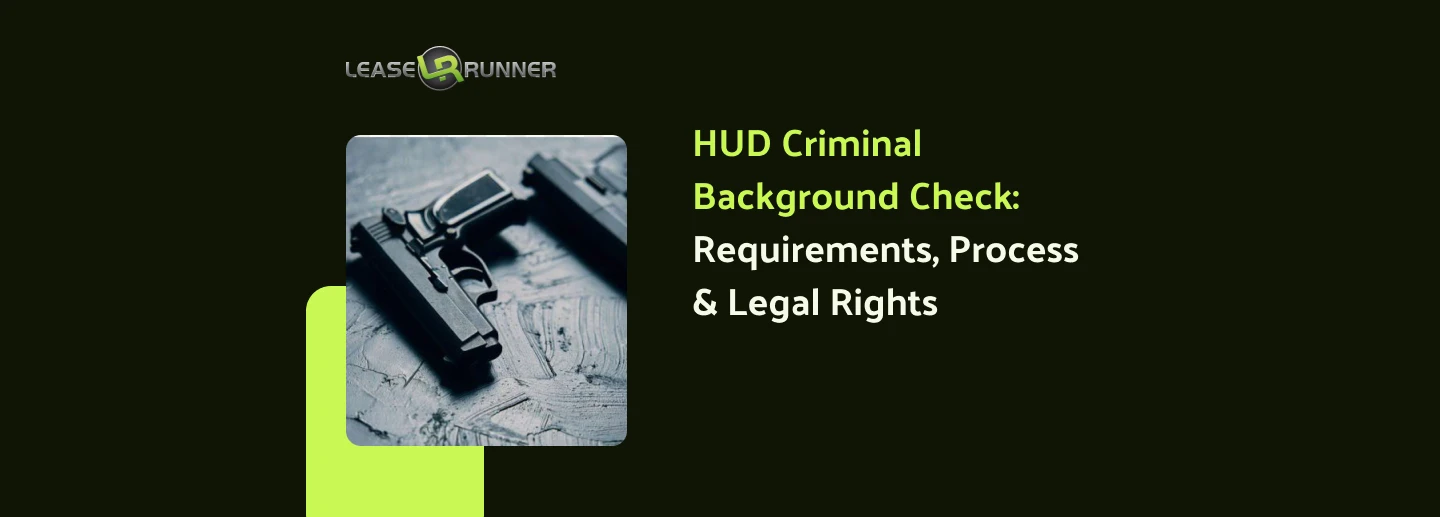As usual, you’ve checked the tenant’s background. To your surprise, the criminal background results came back and made you question: Is it illegal to deny housing to a felon? It comes up a lot, especially as more people try to rebuild their lives after a conviction.

In this article, we’ll dive into the legal side of things, explain what protections exist, and clear up common misconceptions about whether it’s legal to rent to tenants with felony backgrounds.
What is a Felon? Is it Illegal to Deny Housing to a Felon?

A felon is someone who has been convicted of a serious crime, usually one that can lead to a year or more in prison.
Because felonies are serious, people with these records often face extra challenges when trying to rent or buy a home. So, is it illegal to deny housing to a felon? It depends on different things like what kind of crime it was, how long ago it happened, and the rules in the state or city where the person lives.
Landlords can look at a person’s criminal record when deciding to rent, but they can’t just refuse someone without a good reason. Sometimes, saying no just because someone has a felony can cross the line into unfair treatment.
What Is the Fair Housing Act and How Does It Apply to Felons?
The Fair Housing Act is a federal law that helps stop discrimination in housing. It protects people from being treated unfairly because of things like race, religion, sex, where they come from, family status, or disability.
The law doesn’t specifically protect people with criminal records or felonies. But the Fair Housing Act also stops housing rules that might accidentally hurt certain groups of people more than others.
Does the FHA Protect Tenants With a Criminal Record?
The Fair Housing Act (FHA) does not list criminal history as a protected category. That means landlords can consider criminal records when screening tenants.
However, if a housing policy—like rejecting all applicants with a criminal history—disproportionately affects people from protected groups (such as certain racial or ethnic backgrounds), landlords can be considered as discriminatory under the FHA.
Courts and housing agencies look at how these rules are used and whether they are fair. Many landlords now try to look at each person’s situation instead of saying no right away. They might think about what the crime was, how long ago it happened, and if the person has shown they’ve changed.
Are Felons a Protected Class Under Fair Housing Laws?
People with felonies are not part of the groups protected by the Fair Housing Act. Landlords can consider a felony record when deciding who to rent to. Still, rules that automatically say no to anyone with a felony can be against fair housing laws if those rules end up excluding mostly people from certain races or ethnic groups.
This kind of unfair effect is called “disparate impact.” Many experts say landlords should treat each applicant as an individual and not just block all felons from housing to make sure they are following the law and being fair. We’ll discuss it in the next section.
Unfair Disparities: When Denying Housing Becomes Discriminatory
Denying housing without looking closely at the individual’s situation might lead to discrimination, even if the landlord didn’t intend it. That’s why housing providers need to be careful to avoid policies that cause these kinds of problems.
What Is Disparate Impact in Housing?
Disparate impact is a rule or policy that affects one group of people much more than others, even if the rule looks neutral on the surface.
In housing, a rule that bans all people with felony records can exclude mostly people from certain races or ethnic backgrounds because those groups might have higher rates of felony convictions.
Disparate impact is important because it focuses on the effect of the policy, not just the intent behind it. Housing laws watch out for this kind of unfair outcome to protect people from hidden discrimination.
Can a Blanket Ban on Felons Get Landlords in Legal Trouble?
Yes, landlords can get into legal trouble by using a blanket ban on anyone with a felony! The law looks at how such bans affect people and whether they are reasonable. Courts and government agencies often say that landlords must look at each person’s case, instead of just rejecting all felons automatically. This approach helps landlords avoid discrimination claims and treats applicants more fairly.
Blanket bans are risky because they ignore important details like how long ago the crime happened, what type of crime it was, and how the person has behaved since then.
What Does HUD Say About Criminal Records and Tenant Screening?

Let’s talk about HUD (the U.S. Department of Housing and Urban Development) and what they have to say about checking criminal records when someone applies to rent a place. HUD basically wants landlords to be fair and smart about it.
HUD Criminal Records Guidance
HUD’s advice on criminal records is kind of like a friendly reminder for landlords: you can check, but don’t just make blanket rules that block everyone with any criminal history. That’s too broad and can accidentally discriminate against certain groups of people.
Instead, HUD says landlords should look at the specific details, like what the crime was, when it happened, and whether it really matters for living safely in the home. It’s about being fair and thoughtful, not just following a “no felons allowed” sign.
What Does HUD Say About Denying Felons?
HUD really pushes landlords to avoid automatic “no” rules for folks with felony records. Those blanket bans can unfairly keep certain racial or ethnic groups out of housing, which HUD takes seriously. They want landlords to treat each applicant as a person, not just a criminal record.
So, HUD’s message is clear: look beyond the record, hear the story, and make a decision that’s fair and respectful.
When and Why Housing Denial Is Justified
The key is knowing when those reasons make sense and when they cross the line into discrimination.
Reasonable Exclusions and Exceptions for Landlords
Landlords can refuse housing for certain reasons that are considered reasonable and fair.
For example, if someone has a recent conviction for violent crimes, drug dealing on the property, or serious property damage, a landlord may have a good reason to say no. These kinds of exclusions protect the safety and well-being of the community.
To put it blankly, these reasons should relate directly to the safety or security of the rental and not just be used as an excuse to reject anyone with a felony record.
Evaluating Felons on a Case-by-Case Basis
Each person’s situation is different, and landlords are encouraged to look at individual factors. Things like how long ago the conviction happened, the type of crime, evidence of rehabilitation, and current behavior all matter. Taking a case-by-case approach shows fairness and can help landlords avoid legal trouble. It also gives people a real chance to rebuild their lives.
Does Landlord Insurance Cover Tenant Crime or Damage?
Many landlords wonder if their insurance will cover damage or crime caused by tenants. The answer isn’t always simple. Most landlord insurance policies cover accidental damage but might not cover intentional damage or criminal acts.
It’s important for landlords to review their policies carefully and talk to their insurance agent to understand what’s covered and what’s not. This helps landlords protect their investment without unfairly blaming tenants.
The Dos and Don’ts of Renting to Felons
Renting to someone with a felony record takes some extra care and understanding. On the flip side, avoiding common mistakes is just as important to prevent discrimination claims and bad rental experiences.
Dos: Best Practices for Landlords
- Do screen all tenants the same way using clear rules. Use the same screening questions for everyone.
- Do look closely at what the felony was about. Think about what happened, how serious it was, how long ago it happened, and if it has anything to do with being a renter. Not every felony should be treated the same.
- Do pay attention to any signs that the person has changed. If they have a job now, finished a program, stayed out of trouble, or have good references, those are all good signs they’re trying to do better.
- Do explain the screening process clearly to every applicant. Let them know what you’re checking and why. This helps them understand what to expect and gives them a chance to explain anything in their past.
- Do make sure you know and follow the laws in your area. Rules about renting to people with a record can change, and different places have different laws.
Don’ts: Common Mistakes to Avoid
- Don’t automatically say no to anyone with a felony. A rule like that can get you into legal trouble and isn’t fair to people who’ve changed.
- Don’t ignore rules from housing agencies like HUD. They give important guidance on how to treat people fairly. If you don’t follow those rules, you could face complaints or penalties.
- Don’t make your decision just based on the fact that someone has a record. Think about how old the charge is, what it was for, and what the person has done since. Everyone deserves a fair chance.
- Don’t forget to write down your reasons for saying yes or no. If someone questions your decision later, it helps to have notes showing how and why you made your choice.
- Don’t treat people like they’re just their past. Be respectful, listen, and try to see the person, not just the record. A little kindness can go a long way.
How LeaseRunner Helps You Screen Tenants Legally
LeaseRunner offers a simple, easy-to-use tenant screening service that includes criminal background checks and helps landlords like you make smart, fair decisions when considering housing to a felon..
Our service includes detailed criminal background checks alongside other important reports, like credit history and eviction records. We provide every service you need in one place, so you get the full picture of each applicant. This helps you evaluate applicants carefully, consider each person’s unique situation, and avoid unfair blanket bans that could lead to legal trouble.
We also keep up with the latest federal, state, and local housing laws, with up-to-date guides on screening tenants and more, so you have a hub to go to when you need them. When using our services, you can feel confident you’re screening tenants the right way, fairly, legally, and respectfully.
Conclusion: Is It Illegal?
Is it illegal to deny housing to a felon? It’s not illegal to deny housing to someone with a felony, but it can become illegal if the policy is too broad (like a blanket ban) and ends up unfairly affecting protected groups under the Fair Housing Act.
Laws like the Fair Housing Act protect against discrimination that hits certain groups harder. So, be sure to apply careful screening by using tools like LeaseRunner and offer fair treatment to stay on the right side of the law!
FAQs
Q1. Is it legal to discriminate against felons for housing?
Discriminating against felons isn’t directly illegal under federal housing laws. However, using blanket bans that automatically reject all felons can lead to illegal discrimination if those rules disproportionately affect protected groups like certain races or ethnicities. Landlords should evaluate each applicant fairly and avoid overly broad policies to stay within the law.
Q2. Can I rent a house with a felony?
Yes, you can rent a house with a felony, but it might take some extra effort. Landlords often check criminal records, so showing proof of rehabilitation, good references, and a stable income can help. Many landlords consider each person’s situation rather than rejecting all applicants with a felony automatically.
Q3. Can you be denied housing for a misdemeanor?
Yes, being denied housing for a misdemeanor is possible, especially if the crime is recent or relates to safety concerns. But like with felonies, landlords shouldn’t use automatic bans. Each case should be reviewed individually, looking at the type of misdemeanor and how it might affect living in the property.





